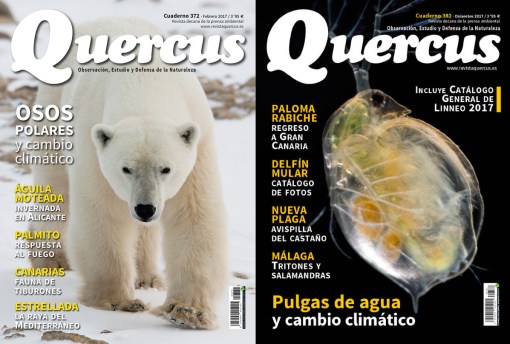I started to blog in the middle of my PhD, exactly on 17 February 2011 — as a scientist I remember my first blog like a soccer-loving kid might remember his/her first soccer ball. Postgraduates from ACAD have recently asked me to give a talk about my blogging experience, and I couldn’t resist turning my talk into a blog.

The cover of the February (polar bears) and December (water flea) 2017 issues of the Spanish magazine Quercus featured two of my popular-science articles. Founded in 1981, and with a current print run of some 15,000 copies monthly, Quercus has pioneered the dissemination of ecological and environmental science with a conservation edge in Spain and survived the digitalisation age, which has recently deserved the prestigious 2018 BBVA prize for Biodiversity Conservation. My liaison with the magazine already spans seven years with 49 articles published in three theme series (conservation biology: 2011-2012; animal behaviour: 2013; and climate change: active since January 2017 in collaboration with my colleague David Vieites).
I write in blogs, but I am not a blogger in the sense of owning and managing a blog. More exactly, I write about science using a language that should be understandable by an audience of scientists and, primarily, non-scientists. The best English expression I have found to qualify such activity is ‘popular science’ (I use it interchangeably with ‘blog’ hereafter). And blogs are just one platform (internet) to publish popular science.
In fact, I publish popular science on a regular basis here in ConservationBytes, and in Quercus: a printed Spanish-language magazine about ecology and biodiversity. My articles in those outlets typically synthesise the findings, and expand the background and implications, of high-profile research papers from the primary literature. Sometimes, I also write blogs to maximise the audience of my own publications (e.g., here and here), or to discuss a topic of general interest (e.g., numerical literacy). I have listed all my blogs on ConservationBytes at the end of the text.
Frankly, I had never stopped to think why I started and why I keep writing popular science. So after a bit of brainstorming, I have come up with five personal motivations which will probably resonate with those of other scientists entering the Blogosphere (1) — see here Corey’s take on the virtues of blogging.
Self-promotion
When you are in the early stage of your research career, letting your peers know that you exist is essential, unless one already publishes hot papers that everybody reads and cites, and/or you have already amassed quite a reputation in the scientific community (not my case). Let’s be clear: my blogs are bound to be read by more people than my research papers, because blogs magnify the chances of being detected by search engines (2), and because the size of the scientific community is dwarfed by the size of the internet community. Doubtless, self-promotion drew me into popular science in the first place, when I was just a PhD student — ahead of me lay some five to ten years over which I would have to compete hard for funding and publication space with a respectable crowd of other researchers, let alone to create new partnerships with colleagues in and out of my area of expertise. So, blogging initially meant like saying ‘hey! I am here, I am doing science’.
















